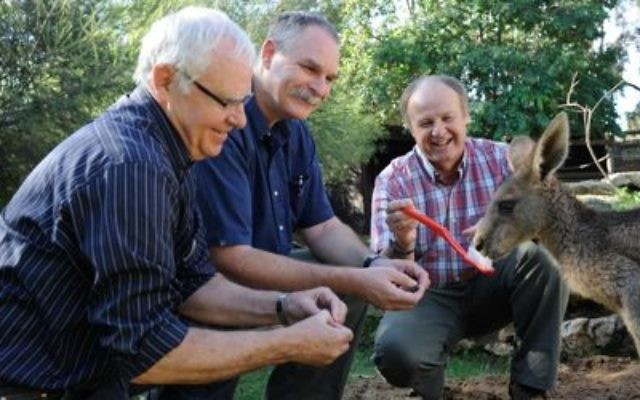Israeli scientists offer new hop for kangaroos
SKIPPY may have a little more bounce in his hop this week, with the news that scientists from the Hebrew University of Jerusalem have perfected an innovative treatment for potentially deadly periodontal diseases in kangaroos.
SKIPPY may have a little more bounce in his hop this week, with the news that scientists from the Hebrew University of Jerusalem have perfected an innovative treatment for potentially deadly periodontal diseases in kangaroos.
The medicine, which is delivered in the form of a topical applied disinfectant varnish, is said to be able to completely cure Necrobacillosis, or Lumpy Jaw, increasing the survival rate for kangaroos suffering from the gum disease to 100 per cent.
Those affected by Lumpy Jaw typically lose the ability to eat and eventually starve to death.
Francisco Scheelings, a vet at Victoria’s Healesville Sanctuary Wildlife hospital, told The AJN that statistics are not kept on the number of kangaroos that die from the ailment each year.
Until now, the aim for wildlife sanctuaries has been to treat the disease by avoiding its onset through tried-and-true preventative techniques.
He added that he could not comment on the effectiveness of the Israeli treatment, but that Australian veterinary doctors welcomed the introduction of new techniques to deal with the scourge.
A 1995 fact sheet on Australian marsupials produced by the University of Adelaide said that while Lumpy Jaw is usually associated with kangaroos in captivity, it has also been observed occasionally in the wild and has always been considered a death sentence for the victim.
“It is associated with overcrowding, poor hygiene or poor diet, although it can occur in situations where none of these factors is apparent,” the pamphlet reads, adding “once the disease is detectable, antibiotic therapy is probably universally unsuccessful without surgery”.
It continues: “Animals suffering will usually show some improvement with treatment, but the disease is only slowed, not cured. Unless the circumstances are exceptional, the animal should be euthanised.”
Israeli scientists said the new treatment has the potential to treat gum disease in cats and dogs as well.
AHRON SHAPIRO


comments